Although often overlooked, baby socks represent a vibrant and evolving segment within global apparel. In 2025, this market is estimated at around $54.3 billion, growing annually at approximately 7.0%. What’s behind this growth—and why should parents pay attention? In this article, you’ll discover key market drivers, emerging trends, regional variations, and what all this means for both parents and niche sellers.
Global Infant Sock Market Overview & 2025 Growth Outlook
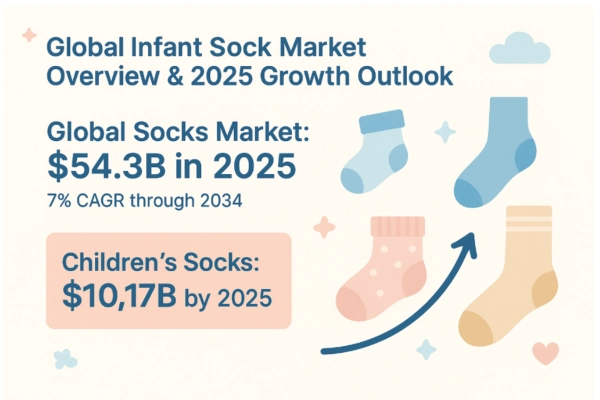
The global socks market—including baby, children’s, and adult socks—is projected at $54.3 billion in 2025, with a steady 7% CAGR expected through 2034. Within that, the children’s socks segment alone is forecast to reach $10.17 billion by 2025.
Parents today increasingly value features beyond just warmth and aesthetics. If you’re curious about the functional and emotional factors that influence parents’ sock selections, explore our in-depth look at Why parents are drawn to infant socks beyond cuteness and warmth.
Key Industry Trends Driving the Infant Sock Sector
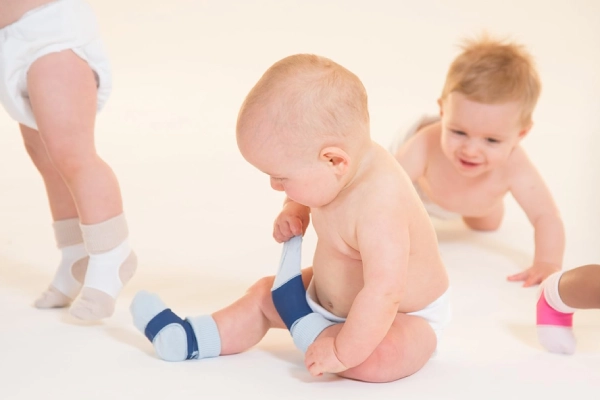
Demand for Eco-Friendly and Organic Materials
Growing environmental awareness is shaping purchase habits. Parents are choosing organic cotton, bamboo, and recycled fibers for their softness and sustainability. To dive deeper into fabric choices, head over to our detailed guide on baby sock materials: from cotton to bamboo and beyond.
Design Innovations: Infant Grip Socks
New designs featuring anti-slip grips and seamless construction are driving both safety and comfort for babies. Notably, grip socks are soaring in popularity. Learn more about how grip socks support babies as they begin walking in our safety-first guide on using grip socks for early walkers.
E-Commerce and the Rise of Social Shopping
Direct-to-consumer brands and social platforms like Instagram and TikTok are transforming how parents discover and buy kids socks. These trends are fueling niche brands and unique product offerings, especially in eco-friendly and customizable categories.
Regional Analysis: Baby Socks Market Opportunities by Geography
- North America:
High disposable income and an established gifting culture keep baby sock demand steady. - Europe:
A strong emphasis on sustainability and certifications underpins growth. - Asia-Pacific:
The fastest-growing region, powered by rising urban incomes and robust e-commerce adoption.
Customized and personalized socks are especially popular as gifts across multiple markets. Learn more in our article on how personalization transforms baby socks into meaningful keepsakes.
Future Outlook: Strategic Trends Shaping the Baby Sock Market
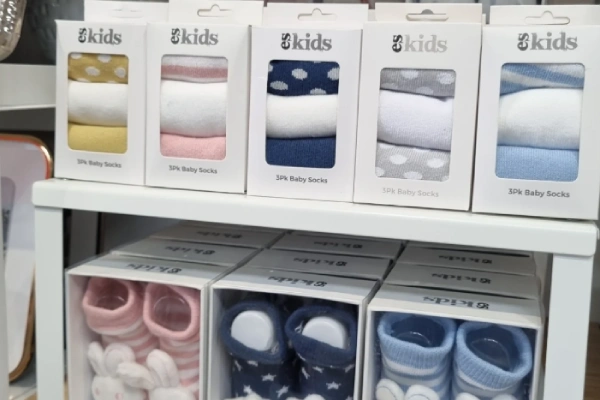
For retailers, buyers, and wholesale distributors, understanding the next wave of trends is the foundation for profitable decisions. While exact long-term numbers for the infant sock segment remain limited, multiple industry signals point toward specific growth areas in the next 3–5 years:
- Personalization at Scale
B2B customers will expect suppliers to offer customizable SKUs — from embroidered initials to thematic seasonal collections — without high MOQs, driven by gifting and “Instagrammable” baby products. - Premium Functional Materials
Demand for eco-certified organic cotton, bamboo blends, warmth wool, and moisture-regulating fabrics will outpace standard cotton products, especially in mid- to high-tier markets. - Multi-Function Designs
Anti-slip soles, temperature-adaptive fibers, and reinforced heel/toe construction will become standard for competitive listings, not niche extras. - D2C-Influenced Wholesale
Successful wholesale models will mimic D2C agility — frequent micro-collections, trend-driven drops, and marketing-friendly packaging for rapid sell-through. - Packaging as a Sales Lever
Retail-ready and gift-ready packaging (sock bouquets, milestone kits) will influence buying decisions at both retail and wholesale levels, making presentation a differentiator.
For a deeper dive into aligning procurement strategy with material trends, see our in-depth breakdown of baby sock fabrics, from eco-certified cotton to advanced blends, and how each impacts wholesale margins → Understanding Baby Sock Fabrics: Cotton, Bamboo, and Beyond.
Immediate Market Opportunities for Industry Players
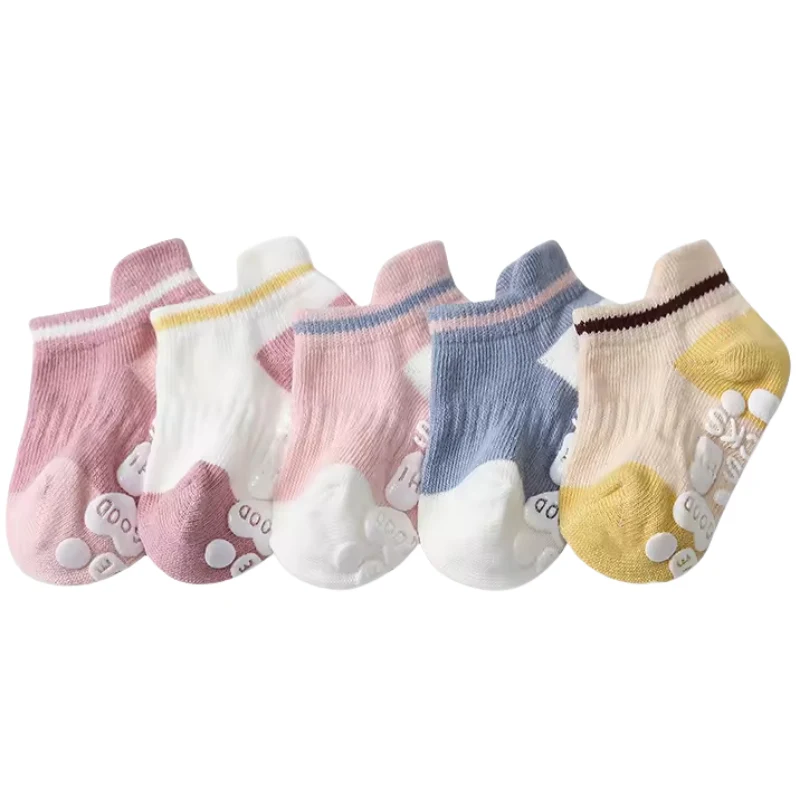
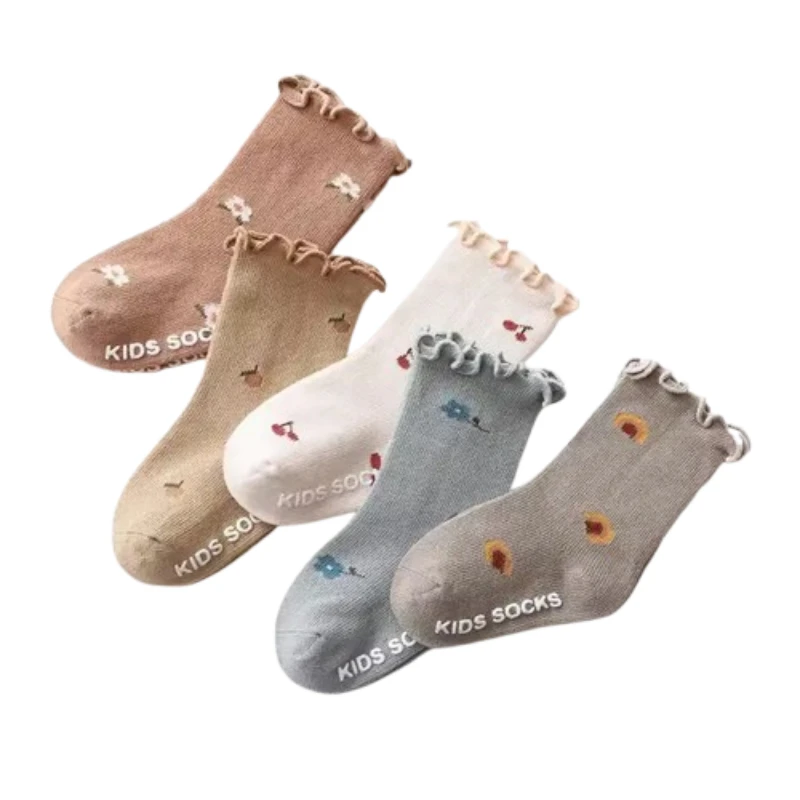
While long-term positioning is crucial, 2025 offers immediate revenue opportunities for those ready to move fast. Retailers, importers, and wholesalers can capitalize on these quick-win strategies:
- Tap Into Seasonal Demand Windows
Secure stock for key baby gifting occasions — baby showers, “first steps” milestones, and holiday bundles — well ahead of peak shopping months. - Bundle for Higher Ticket Sizes
Offer multi-pair sets or mix-and-match collections that encourage upselling and fit gift-pack price points. - Leverage Small-Batch Differentiation
Introduce limited runs with unique patterns or colors to create scarcity and urgency for buyers. - Source From Flexible, Low-MOQ Suppliers
Partner with manufacturers who can adapt to trend shifts quickly without locking you into high inventory risk. - Co-Brand With Boutiques or Influencers
Collaborative lines with trusted names in the parenting niche can open new wholesale channels and improve shelf turnover.
For sourcing efficiency and quality assurance, explore our comprehensive step-by-step guide to identifying and vetting high-quality baby sock suppliers, including recommended MOQs, inspection methods, and negotiation tips → How to Source Quality Baby Socks for Your Store or Event.
FAQ: Market Insights for Baby Socks in 2025
How large is the baby sock market right now?
The global socks market is projected to reach $54.3 billion in 2025, growing at around 7% per year, while the children’s socks segment is estimated at $10.17 billion.
What’s driving the rise in eco-friendly socks?
Environmental awareness and concerns about baby skin sensitivity are encouraging parents to favor organic or sustainable fiber options.
Which region is growing the quickest?
Asia-Pacific leads, thanks to rising incomes, urbanization, and booming e-commerce. Europe is stable, driven by sustainability, while North America benefits from strong consumer spending.
Why are grip socks becoming so popular?
Their anti-slip design enhances early walking safety—both practical and parent-approved, especially in modern home environments.
Interested in selling customized baby socks?
Target eco-conscious, gift-oriented niches and explore our sourcing guide for help navigating quality suppliers.
Conclusion
The 2025 infant sock market is positioned for strong growth, driven by rising demand for premium materials, functional design, and personalized offerings. For retailers, wholesalers, and buyers, the opportunity lies in anticipating these trends early, securing reliable suppliers, and building product lines that align with both functional needs and market aesthetics.
Staying ahead means more than just stocking inventory — it’s about curating the right mix, optimizing packaging for retail impact, and capitalizing on seasonal and gifting cycles.
📌 Ready to position your business for growth in the infant sock segment?
Start by visiting our website to explore detailed resources on sourcing and customizing high-quality infant socks for wholesale and retail — including vetted supplier directories, quality control checklists, and strategies for maximizing margins while offering unique, market-ready designs.
